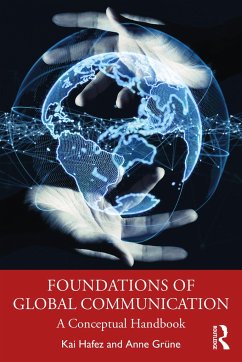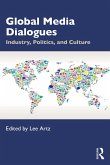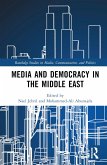This book provides a wide-ranging theoretical and empirical overview of the disparate achievements and shortcomings of global communication.
This exceptionally ambitious and systematic project takes a critical perspective on the globalization of communication. Uniquely, it sets media globalization alongside a plethora of other globalized forms of communication, ranging from the individual to groups, civil society groupings, commercial enterprises and political formations. The result is a sophisticated and impressive overview of globalized communication across various facets, assessing the phenomena for the extent to which they live up to the much-hyped claims of globalization's potential to create a globally interdependent society. The setbacks of globalization, such as right-wing populism and religious fundamentalism, can only be understood if the shortcomings of global communication are taken more seriously.
Covering all types of cross-border global communication in media, political and economic systems, civil societies, social media and lifeworlds of the individual, this unique book is invaluable for students and researchers in media, communication, globalization and related areas.
This exceptionally ambitious and systematic project takes a critical perspective on the globalization of communication. Uniquely, it sets media globalization alongside a plethora of other globalized forms of communication, ranging from the individual to groups, civil society groupings, commercial enterprises and political formations. The result is a sophisticated and impressive overview of globalized communication across various facets, assessing the phenomena for the extent to which they live up to the much-hyped claims of globalization's potential to create a globally interdependent society. The setbacks of globalization, such as right-wing populism and religious fundamentalism, can only be understood if the shortcomings of global communication are taken more seriously.
Covering all types of cross-border global communication in media, political and economic systems, civil societies, social media and lifeworlds of the individual, this unique book is invaluable for students and researchers in media, communication, globalization and related areas.
In this breakthrough investigation, Kai Hafez and Anne Grüne place globalization, one of the most popular keywords of our times, under renewed critical scrutiny. In a powerful conceptual language, they develop an original account of the asymmetries and tensions of our interconnected world and offer a novel understanding of how its various communicative actors and their systemic relations, at once, bind us together and keep up apart. The outcome is a compelling narrative that sheds light on some of the most urgent challenges of our time, including the rise of global fundamentalisms and illiberal populisms. A must-read.
Prof. Lilie Chouliaraki, London School of Economics and Political Science
This is a wide-ranging, sophisticated yet critical discussion of the globalization of communication. Telescoping from the systemic to the individual, and encompassing politics, commercial networks and media systems, the book provides a multi-faceted assessment of the potential and limitations of global communications.
Prof. Herman Wasserman, University of Cape Town, South Africa
Hafez and Gruene's book offers much needed insight into the challenges of today's diversity of globalized interconnections. It is an excellent source for scholars and students alike when aiming to assess globalized communication in its concrete current formations. Through combining conceptual debates and empirical insights, the book is a key read to understand the multifacted interactions of our digital world.
Prof. Ingrid Volkmer, University of Melbourne, Australia
"Von der Erforschung vielschichtiger Interdependenzen (...) bis zur nötigen Verantwortung der Global Player ist hier anspruchsvoll nachzulesen. M.E. alternativlos"
Annette Rugen, ekz.bibliotheksservice (https://www.ekz-group.com)
Translation:
"The deep structure (of the handbook) enables users targeted entries. Readers receive complex and sophisticated information about multi-layered interdependencies (nation state vs. transnationalization, global elites vs. local majorities, role of the media) and the relevant responsibilty of global players. There is not alternative to this book."
Annette Rugen, ekz.bibliotheksservice (https://www.ekz-group.com)
"Hafez und Grüne gelingt es mit ihrem Handbuch, die Kommunikationstheorie prominent zu platzieren. (...) (Sie) tragen zu einer soliden Fundierung und fruchtbaren Diskussion zur Globalisierungsdebatte aus kommunikationswissenschaftlicher Sicht bei. (...) Nehmen Sie dieses Handbuch auch wirklich physisch oder virtuell "in die Hand". Das Lesen ist ein Gewinn."
Prof. Dr. Thomas Herdin, Univ. of Salzburg, Publizistik 2021
Translation:
"Hafez und Grüne successfully and prominently position communication theory in the globalization debate. (...) They contribute to a solid foundation and fruitful discussion of globalization from the perspective of communication studies. (...) Make sure that you take this handbook really "into your hands". You will definitely profit from reading it." (own translation)
Prof. Dr. Thomas Herdin, Univ. of Salzburg, Publizistik 2021
This extremely useful and timely translation of the original German publication by Hafez and Grüne is a great resource for students and researchers alike, as it deeply enriches - both theoretically and methodologically - the burgeoning literature on global communication'.
Prof. Daya Thussu, Baptist University, Hong Kong
Prof. Lilie Chouliaraki, London School of Economics and Political Science
This is a wide-ranging, sophisticated yet critical discussion of the globalization of communication. Telescoping from the systemic to the individual, and encompassing politics, commercial networks and media systems, the book provides a multi-faceted assessment of the potential and limitations of global communications.
Prof. Herman Wasserman, University of Cape Town, South Africa
Hafez and Gruene's book offers much needed insight into the challenges of today's diversity of globalized interconnections. It is an excellent source for scholars and students alike when aiming to assess globalized communication in its concrete current formations. Through combining conceptual debates and empirical insights, the book is a key read to understand the multifacted interactions of our digital world.
Prof. Ingrid Volkmer, University of Melbourne, Australia
"Von der Erforschung vielschichtiger Interdependenzen (...) bis zur nötigen Verantwortung der Global Player ist hier anspruchsvoll nachzulesen. M.E. alternativlos"
Annette Rugen, ekz.bibliotheksservice (https://www.ekz-group.com)
Translation:
"The deep structure (of the handbook) enables users targeted entries. Readers receive complex and sophisticated information about multi-layered interdependencies (nation state vs. transnationalization, global elites vs. local majorities, role of the media) and the relevant responsibilty of global players. There is not alternative to this book."
Annette Rugen, ekz.bibliotheksservice (https://www.ekz-group.com)
"Hafez und Grüne gelingt es mit ihrem Handbuch, die Kommunikationstheorie prominent zu platzieren. (...) (Sie) tragen zu einer soliden Fundierung und fruchtbaren Diskussion zur Globalisierungsdebatte aus kommunikationswissenschaftlicher Sicht bei. (...) Nehmen Sie dieses Handbuch auch wirklich physisch oder virtuell "in die Hand". Das Lesen ist ein Gewinn."
Prof. Dr. Thomas Herdin, Univ. of Salzburg, Publizistik 2021
Translation:
"Hafez und Grüne successfully and prominently position communication theory in the globalization debate. (...) They contribute to a solid foundation and fruitful discussion of globalization from the perspective of communication studies. (...) Make sure that you take this handbook really "into your hands". You will definitely profit from reading it." (own translation)
Prof. Dr. Thomas Herdin, Univ. of Salzburg, Publizistik 2021
This extremely useful and timely translation of the original German publication by Hafez and Grüne is a great resource for students and researchers alike, as it deeply enriches - both theoretically and methodologically - the burgeoning literature on global communication'.
Prof. Daya Thussu, Baptist University, Hong Kong








